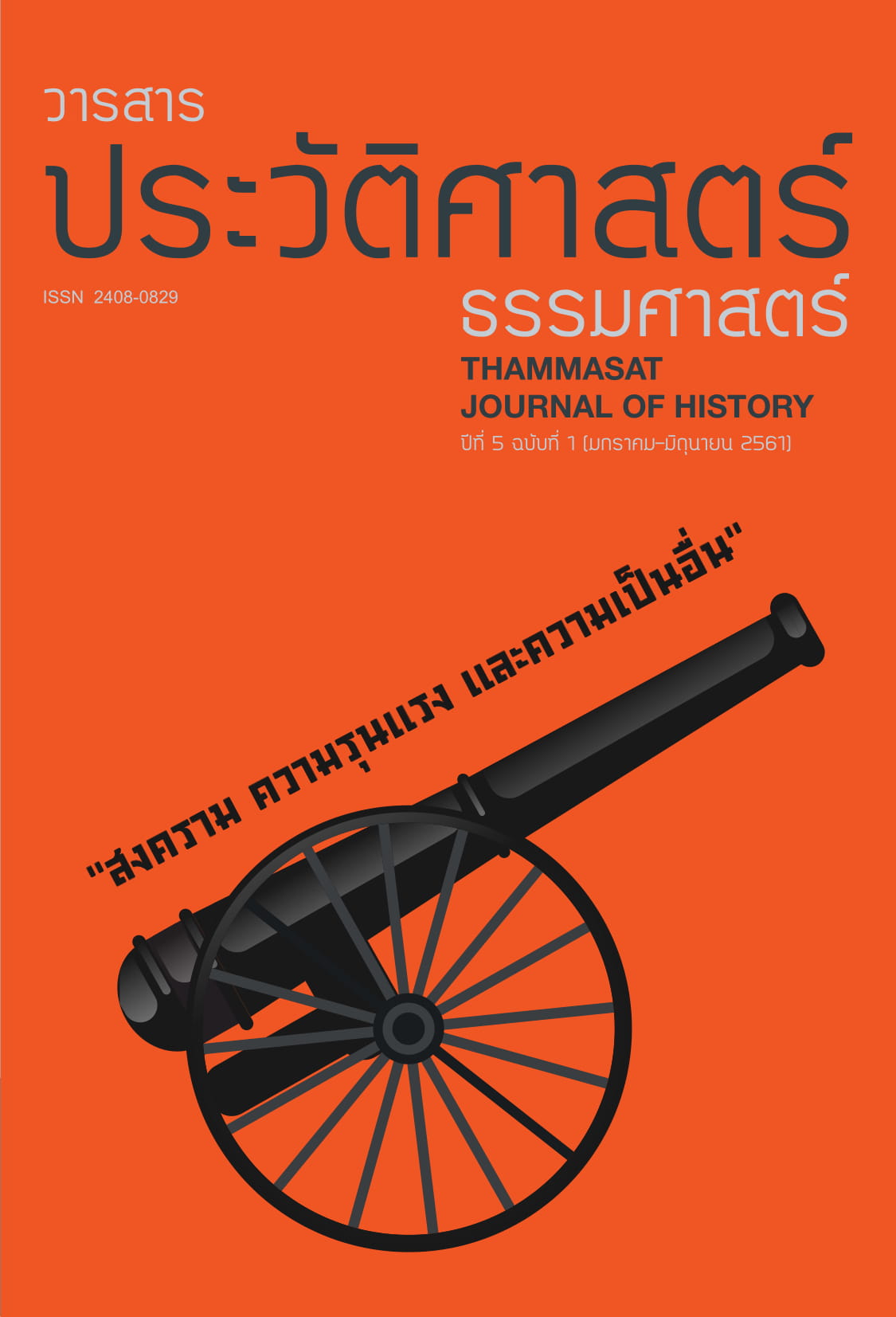เส้นแบ่งอัตลักษณ์ในอินโดนีเซีย: ความเกลียดชัง "คนอื่น" ในแคมเปญต่อต้านอาฮก
Main Article Content
บทคัดย่อ
บรรยากาศการเมืองในยุคหลังระเบียบใหม่และนโยบายต่างประเทศของอินโดนีเซียที่มุ่งเน้นการปฏิสัมพันธ์กับจีน ส่งผลกระทบต่อการพัฒนาเศรษฐกิจของอินโดนีเซียและการสร้างเครือข่ายความสัมพันธ์ทางวัฒนธรรมระหว่างชาวจีนอินโดนีเซียและจีน ชาวจีนอินโดนีเซียที่เคยถูกปิดกั้นสิทธิเสรีภาพทางการเมืองและการแสดงอัตลักษณ์ความเป็นจีนในยุคระเบียบใหม่นั้น ปัจจุบันนี้ได้เข้ามามีส่วนร่วมทางการเมืองและรื้อฟื้นวัฒนธรรมโดยเฉพาะภาษาจีนตอบรับการผงาดขึ้นของจีนและโอกาสทางเศรษฐกิจของปัจเจกชน แต่อย่างไรก็ดีเมื่อพิจารณาถึงเหตุการณ์ประวัติศาสตร์ความรุนแรงต่อต้านชาวจีนในอินโดนีเซียแล้วนั้น ปฏิเสธไม่ได้ว่าความขุ่นเคืองต่อกลุ่มชาวจีนอินโดนีเซียยังคงมีอยู่ในสังคม ชาวจีนอินโดนีเซียยังคงถูกมองว่าเป็นกลุ่มชนชั้นที่กุมอำนาจเศรษฐกิจและเป็นคนนอกศาสนาอิสลาม (Infidel) ความสัมพันธ์ระหว่างชาวจีนอินโดนีเซียและชาวอินโดนีเซียยังคงถูกท้าทายจากความรุนแรงและตึงเครียดทางชาติพันธุ์ศาสนาอยู่หลายเหตุการณ์ อันสะท้อนให้เห็นว่าสังคมพหุวัฒนธรรมของอินโดนีเซียในยุคปฏิรูปนี้ยังคงมีความเปราะบาง งานชิ้นนี้ถกเถียงถึงมรดกตกค้างจากยุคซูฮาร์โตไม่ว่าจะเป็นอิสลามนิยมความรุนแรง ความเกลียดชังจีน ความกลัวลัทธิคอมมิวนิสต์ใหม่ และความเกลียดชังชาวจีนอินโดนีเซียที่ถูกนำมาใช้ขับเคลื่อนในแคมเปญต่อต้านอาฮกในปี 2016-2017
Article Details
ลิขสิทธิ์บทความเป็นของผู้เขียนและสงวนสิทธิ์ตามกฎหมาย
ข้อคิดเห็นใดๆ ที่ปรากฏในวารสารนี้เป็นของผู้เขียน คณะกรรมการวารสาร ภาควิชาประวัติศาสตร์ฯ กองบรรณาธิการ ตลอดจนกรรมการกลั่นกรองประจำฉบับ ไม่จำเป็นต้องเห็นพ้องกับข้อคิดเห็นเหล่านั้น
เอกสารอ้างอิง
Abuza, Zachary. Political Islam and Violence in Indonesia. New York: Routledge, 2007.
Anderson, Benedict. Violence and the State in Suharto’s Indonesia. New York: SEAP Publication, 2001.
Chiang, Bien and Cheng, Jean Chih-yin. “Ethnic Chinese Enterprises in Indonesia: A Case Study of West Kalimanta.” in Chinese Capitalism in Southeast Asia. ed. Yos Santasombat. Singapore: Palgrave Macmillan, 2017.
Hwang, Julie Chernov. Peaceful Islamist Mobilization in the Muslim World: What Went Right. Palgrave Macmillan, 2009.
Hoon, Chang-Yau. Chinese Identity in Post-Suharto Indonesia: Culture, Politics and Media. Sussex: Sussex Academic Press, 2008.
Kakar, Sudhir. The Colors of Violence: Cultural Identities, Religion, and Conflict. Chicogo: University of Chicago Press,1996.
Kavalski, Emilian. The Ashgate Research Companion to Chinese Foreign Policy. Burlington: Ashgate, 2016.
Priyono, A.E. Kuntowijoyo. Paradigma Islam: interpretasi untuk aksi. Jakarta: PT Mizan Publika, 2008.
Purdey, Jemma. Anti-Chinese Violence in Indonesia. Honolulu: University of Hawaii Press, 2006.
Setijadi, Charlotte “Being Chinese Again Learning Mandarin in Post-Suharto Indonesia.” in Multilingualism in the Chinese Diaspora Worldwide: Transnational Connections and Local Social Realities. ed. Li Wei. London: Routledge, 2016, 141-157.
Setiono, G. Benny. Tionghoa Dalam Pusaran Politik. Jakarta: TransMedia, 2008.
Sukma, Rizal. “Indonesia-China Relations: The Politics of Reengagement,” in Living with China: Regional State and China through Crises and turning points. ed. Shiping Tang, Mingjiang Li and Amitav Acharya. New York: Palgrave Macmillan, 2009.
Suryadinata, Leo. The Rise of China and the Chinese Overseas: A Study of Beijing’s Changing Policy in Southeast Asia and Beyond. ISEAS Yusof Ishak Institute, 2017.
Suryadinata, Leo. “Buddhism and Confucianism in Contemporary Indonesia: Resent Developments.” in
Chinese Indonesians: Remembering, Distorting, Forgetting. ed. Tim Lindsley and Helen Pausacker. Singapore: Institute of Southeast. Asian Studies, 2005.
Tong, Chee-Kiong. Identity and Ethnic Relations in Southeast Asia: Racializing Chineseness. Berlin: Springer, 2010.
Varshyney, Ashutosh. Ethnic Conflict and Civic Life: Hindus and Muslims in India. New Haven: Yale University Press, 2002.
Aly, Anne and Jason-Leigh Striegher. “Examining the Role of Religion in Radicalization to Violent Islamist Extremism.” Studies in Conflict & Terrorism 35, no. 12 (2012): 849-862.
Aly, Anne, Anne-Marie Balbi and Carmen Jacques. “Rethinking Countering Violent Extremism: Implementing the Role of Civil Society.” Journal of Policing, Intelligence and Counter Terrorism 1 (2015): 3-13.
Eicki, Susan. “A History of Indonesian Telecommunication Reform 1999-2006”. Proceedings of The 40th Hawaii International Conference on System Sciences (2007): 1-10.
Hoon, Chang-Yau. “Mapping ‘Chinese’ Christian Schools in Indonesia: Ethnicity, Class and Religion.” Asia Pacific Education Review 12 (2011): 403-411.
Lim, Merlyna. “Freedom to Hate: Social Media, Algorithmic Enclaves, and the Rise of Tribal Nationalism in Indonesia.” Critical Asian Studies 49, no. 3 (2017): 411-427.
Setijadi, Charlotte. “Ethnic Chinese in Contemporary Indonesia: Changing Identity Politics and the Paradox of Sinification.” Perspective, no 12 (2016): 1-11.
Suryadinata, Leo. “Blurring the Distinction between huaqiao and huaren: China’s Changing Policy towards the Chinese Overseas.” Southeast Asian Affairs, (2017): 101-113.
Yen-Ling, Tsai. “Space of Exclusivity, Wall of Intimacy: Rethinking “Chinese Exclusivity.” in Indonesia,” Indonesia Journal, 92 (2011): 125-156.
Chontida Auikool. “Ethnic Relations in Multicultural Medan in post-Suharto Indonesia.” MA Thesis, Political Science Thammasat University, 2013.
Wu Ling, Chong. “Democratization and Ethnic Minorities: Chinese Indonesians in Post-Suharto Indonesia.” PhD Diss., Department of sociology National University of Singapore, 2014.
Balea, Judith. “The latest stats in web and mobile in Indonesia.” Techin Asia, January 28, 2016. https://www.techinasia.com/indonesia-web-mobile-statistics-we-are-social. (accessed July 1, 2017).
Gunawan, Hendra. ”Sofyan Tan Raih Suara Terbanyak di Sumut 1.” Tribunnews, April 25, 2014. http://www.tribunnews.com/regional/2014/04/25/sofyan-tan-raih-suara-terbanyak-di-sumut-1. (accessed July 1, 2016).
Lahagu, Asaaro. “Implikasi Kerjasama Cina-Indonesia Masuknya Ribuan Pekerja Cina di Baten dan Papua.” Kompasiana, July 4, 2015. https://www.kompasiana.com/lahagu/imp-likasi-kerjasama-cina-indonesia-masuknya-ribuan-peker-ja-cina-di-banten-dan-papua_559792bad67e619d07b-176dc. (accessed December 1, 2017).
Lamp, Kate. “Jakarta governor Ahok’s blasphemy trial: all you need to know.” The guardian, December 12, 2016. https://www.theguardian.com/world/2016/dec/12/jakarta-gover-nor-ahoks-blasphemy-trial-all-you-need-to-know (accessed July 7, 2016).
Nairn, Allan. “Trump’s Indonesian allies in bed with ISIS-backed militia seeking to oust elected President.” The Intercept, April 19, 2017. https://theintercept.com/2017/04/18/trumps-indonesian-allies-in-bed-with-isis-backed-militia-seeking-to-oust-elected-president/. (accessed July 6, 2017).
Nurbilkis, Mulya. “Penuh Emosi, Ahok: Koruptor yang Suka Nyolong Bukan Indonesia Asli.” Detik News, May 25, 2015. https://news.detik.com/berita/2924447/penuh-emosi-ahok-koruptor-yang-suka-nyolong-bukan-indonesia-asli. (accessed December 7, 2017).
Radar Islam, “Buat sayembara bunuh Ahok berhadih 1 Milyar, Pria ini dipolisikan.” Radar Islam, November 4, 2016. http://www.radarislam.com/2016/11/buat-sayembara-bunuh-ahok-berhadiah-1.html. (accessed July 6, 2017).
Salna, Karlis. “Like Bali? Indonesia wants to create 10 of them to draw Chinese tourists.” Jakarta Post, October 20, 2017. http://www.thejakartapost.com/travel/2017/10/20/like-bali-Indonesia-wants-to-create-10-of-them-to-draw-chinese-tourists.html. (accessed December 1, 2017).
The Jakarta Post. “Meaning of ndeso that led to police report against Jokowi’s son.” The Jakarta Post, July 7, 2017. http://www.thejakartapost.com/life/2017/07/07/meaning-of-nde-so-that-led-to-police-report-against-jokowis-son.html (accessed July 7, 2017).
The Straits Times. “China upset with ‘chili conspiracy’ in Indone-sia.” The Straits Times, December 17, 2016. http://www.straitstimes.com/asia/se-asia/china-upset-with-chilli-con-spiracy-in-indonesia. (accessed July 6, 2017).
Winarno Zain, “Indonesian exports: a predicament from China.” The Jakarta Post, June 1, 2015. http://www.thejakartapost.com/news/2015/06/01/indonesian-exports-a-predicament-china.html. (accessed December 6, 2017).


